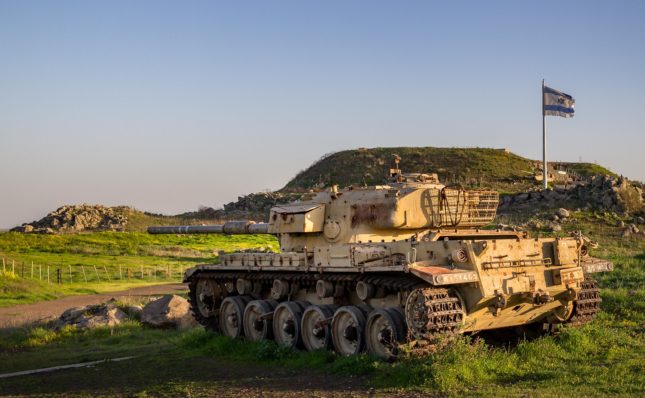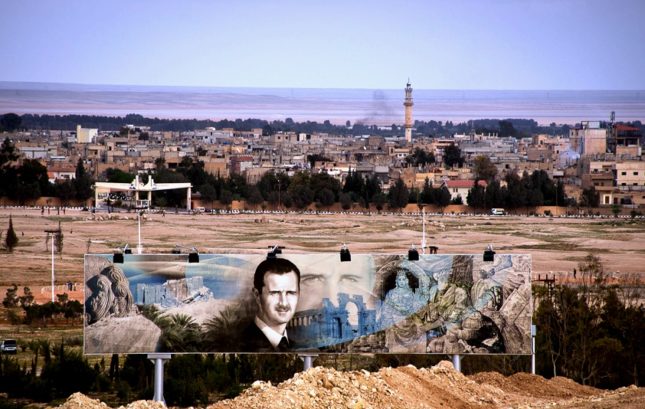Seven Years of Killing Fields in Syria: An Imbroglio of Proxy Wars

We are reaching the seventh-year anniversary of the tragic conflict in Syria, which seems to evolve and get more complex as time goes on. If nothing else, with the recent downing of an Israeli F16 by the Syrian army of Bashar al-Assad, which was the first time an Israeli jet was shot down for breaching Syrian air space, the conflict could even grow, with sustained intrusions from Israeli military forces in Syria and tit-for-tat retaliations against Israel by Hezbollah opening a front between Israel and Lebanon. Diffusing the simmering tensions between Israel and Iran/Hezbollah has become imperative to avoid the conflict becoming regional, and the only party that can broker such a deal is Russia, probably with the assistance of Turkey.
Israel is claiming that the provocation came from an Iranian drone breaching their airspace, and this is why the international community wants Moscow to put pressure on Tehran. There is a lot of posturing on all sides. For example, Israeli Brigadier General Amit Fisher, IDF’s commander on the Syrian border, said after the downing of the F16:
“We need to prepare ourselves operationally for the mounting threat. The big test will be the test of war.”
What Amit Fisher is not saying is that the big test will come when Bashar al-Assad’s army will want to retake control of the Syrian part of the Golan Heights. For his part, Iranian official Ali Shamkhani, Secretary of the National Security Council, said in the aftermath of the incident that
“The Syrian nation proved this time that it will respond to any act of aggression, as the era of hit and run is over.”
Overall, while Bashar al-Assad’s Syrian army is reclaiming territories on the battlefield, Israel and the United States are trying to derail the process and setting up shifting red lines.
At the recent international Munich Security Conference, Israeli Prime Minister Benjamin Netanyahu, known for his occasional histrionics, brought along a piece of metal, which he claimed was a part of the Iranian drone, as evidence of the alleged Iranian intrusion, and served Tehran a flourish of threats punctuated with the usual Bibi pseudo-comical theatrics. While smirking and brandishing the piece of metal junk, Netanyahu gave the Islamic Republic a warning and said that “the tyrants of Tehran should not test Israel’s resolve.” He added, in the specific context of Syria:
“We will act, if necessary, not just against Iran’s proxies, but against Iran itself.”

The revival of this tough rhetoric towards Tehran from Netanyahu is not about the drone episode and not even specifically about Syria. Beyond the theatrics, there are two real issues: firstly, a desperate push by Tel Aviv, with the support of the Trump administration, to cancel the 2015 nuclear agreement with Iran; secondly, a classic wag-the-dog stunt from an Israeli PM who could, at any given time, be indicted by the Israeli police on the charge of corruption and accepting bribes for political favors.
Netanyahu is in political trouble. At a recent rally in Israel some signs called the prime minister a “crime minister.” For politicians in history, it has been a standard operating procedure to foster conflicts abroad, often artificially, when their political situations become precarious on the home front. Unless this is exposed, it works as a dangerous distraction. This is the definition of the wag-the-dog strategy.
Netanyahu’s push, with the assistance of the Trump administration, to scrap the 2015 international nuclear agreement with Iran, will be a no go. While in Munich, Netanyahu had the impudence to compare the nuclear deal to the disastrous 1938 Munich agreement that was signed by Western powers and Adolf Hitler on the incredible premise to avoid war. Unfortunately for Netanyahu and Trump, the other signatories to the nuclear deal, which are France, Britain, Germany, Russia and China, think that the agreement is working fine and do not want to renegotiate it. For his part, at the Munich Security conference and in blatant contradiction to the Trump administration, former US Secretary of State John Kerry defended the deal he had helped to broker and categorically dismissed Netanyahu’s assertions.
Anti-Iranian narrative and the paranoia of the Islamic Republic being “an existential threat for Israel” has helped Netanyahu maintain his grip on power for a long time. It seems that time is up for Bibi. In the post-Netanyahu era coming soon, perhaps Israelis will understand that stability in Syria, which was secured for decades with the strong rule of the Assads is far from perfect but better than endless war. Israelis should understand as well that a detente with Iran is ultimately in the interest of the Jewish state, as opposed to Netanyahu’s murky and barely secret alliance with Saudi Arabia‘s despot and king in waiting Mohamed bin-Salman. People in Israel, just like the populations of other regional powers, and that is especially true for their temporary allies the Kurds, must understand that in the Middle East the notion of Pax Americana is worse than a myth. It is a grotesque lie. The interest of the US, an empire run by and for the military-industrial complex, is permanent war, not peace. In Syria, if peace finally comes along after seven years of hell, it will be Pax Russiana.
What is remarkable in the Syrian conflict, and this fact has not escaped astute Western geopolitical analysts, is that Russia, not the US, is the unquestionable broker because of its military intervention in 2015 and its role with Turkey and Iran. The Russian leadership role has to be assumed firstly within the Russian, Iranian, Turkish and Hezbollah coalition, and secondly in the context of regional consultations, most essentially with Israel. Increased pressure should be put by Moscow on both Tel Aviv and Tehran to avoid further escalation. But what has triggered this apparent setback and increased number of military incidents, such as the recent downing of a Russian SU-25 by al-Nusra front or the US air strikes against Syrian pro-government forces in Deir Ez-Zor, is obviously a way for the US and Israel to counter the substantial gains made by the forces of Bashar al-Assad on the battlefield. It is also definitely an effort, from all parties, to maximize battlefield gains before potential peace negotiations, but it is overall a dangerous game. It seems that the West wants the Syrian abscess to fester indefinitely. By contrast, Syria’s neighbors, such as Turkey, Israel, Lebanon, Jordan and Iraq, could soon come to realize that only a strongman like Bashar al-Assad can bring Syria out of its present chaos.
In the killing fields and ruins of Syria many proxy wars, either regional or global, rage in a shifting web so elusive that at times it seems too opaque to see even remote possibilities of peaceful political resolutions. Since 2011 more than 500,000 people have died in Syria and 13 million Syrians have been displaced either outside Syria, mainly to Turkey, Lebanon and Jordan, or internally like countless tumbleweeds at the mercy of war. Curiously, the West, despite its humanitarian narrative, has pushed through the years contradictory policies that have fostered, just like in Libya, the ongoing crisis in Syria. At times the West says Assad must go, but on other occasions the dissonant chorus says maybe Assad can stay. Should Assad stay or should he go is indeed one of the questions the different parties should agree upon. But in all tragedies there are elements of comedy and even absurdity. One has to admit: it is rather ironic for Turkey to call its military operation against Syrian Kurds “Olive Branch” considering that an olive branch is a symbol of peace.

Turkey’s military operation on Afrin, a territory controlled by Syrian Kurds, is an issue with the US which happens to be, in a blatant contradiction, allied with the Turks in the context of NATO and also a sponsor of Kurdish forces, which the US military views as their main foot soldiers in Syria. Before launching his Olive Branch Operation, PM Erdogan had consulted Moscow, and one can suspect that, through the Russian channel, Bashar al-Assad was not only informed but actually understood that weakening the Syrian Kurds, allied on the ground with the Americans, was to his advantage. Let us not forget that Turkey, for decades, had no problems with the Assad dynasty’s rule of Syria. In the early stages of the conflict, Turkey was on the Sunni side with Saudi Arabia, Qatar, Israel, and the West actively pouring gasoline on the fire by arming and financing proxy Jihadists of all stripes to topple Bashar al-Assad; Washington’s increased coziness with the Kurds, however, has triggered Erdogan to rethink his Syria policy. Ultimately, Turkey’s prime minister understood that forming a de facto coalition with Russia and Iran was, not only in his country’s interest, but also critical for a chance of regional stability.
The fact that Damascus has apparently been in contact with Syrian Kurd forces fighting the Turks in Afrin and that Bashar al-Assad’s army could join them against the Turkish forces is extremely troubling. Considering that the Kurds are the foot soldiers of the Americans in Syria, it would be a huge strategic mistake on the part of Bashar al-Assad, who has so far been remarkably resilient and shrewd. His impulse to help the Syrian Kurds against the Turks has a historical component to it. Let us not forget that Turkey, as the Ottoman Empire, has a history of invading the region. As a matter of fact, Syria was part of the Ottoman Empire for around 600 years. That said, what should matter to Assad, more than history, is the integrity of the coalition on his side, which includes Turkey. Assad has been warned by Erdogan not to intervene, and it is likely that Russia and Iran will put pressure on Damascus not to join the Kurds in Afrin.
Arguably, the main agent of chaos in Syria, just like it has been in Iraq and Libya, was and still is the US. Despite the apparent schizophrenic aspect and inconsistency of US foreign policy, such as in the instance of Syria being allied with Turks and Kurds who are enemies, the consistent element is that once the US military sets foot on the ground in a country it does become a permanent occupation. Officially, the Pentagon says that it has 2,000 troops in Syria; with black ops the real number could easily be 4,000.

In a January 17, 2017 conversation between Secretary of State Rex Tillerson and Condoleeza Rice on the US way forward in Syria, Secretary Tillerson stated that American troops will remain in Syria long after their fight against ISIS is over to ensure that “Neither Iran nor Bashar al-Assad take over areas that have been newly liberated with the help of the US.” Tillerson called the Assad administration as well as Iran “malignant.” His narrative was full of lies and straight out of the neocon lexicon: blatant lies about Assad originally sponsoring ISIS and al-Qaeda; lies and arrogance about the Trump administration claiming credit for the defeat of ISIS in Iraq and Syria.
One Tillerson statement illustrates well the completely false US narrative on Syria, and it has to be quoted: “For nearly 50 years the Syrian people have suffered under the dictatorship of Hafez al-Assad and his son Bashar al-Assad. The nature of the Assad regime, like that of its sponsor Iran, is malignant. It has promoted state terror and empowered groups such as al-Qaeda.” Never mind fake news, this is a gem of fake history! But let us judge US imperialism by what it does, not what it says. Look at Afghanistan, Iraq, Libya, Syria and Yemen: beyond its web of lies the Orwellian Empire is in the business of engineering failed states either directly or through proxies.
In Syria’s seven-year hell, the country’s ruins have been soaked with the blood of 500,000 people. Thirteen million Syrians have been scattered to the winds, either outside or inside Syria. A few months ago a cease fire was within reach, under the impulse of Russia, Iran and Turkey. But the mayhem is back: the bombs are falling again, and the guns are blazing. A complete country, which was part of Mesopotamia, known to be the cradle to civilization, has been reduced to rubble for the sake of a perverse geopolitical game where most Syrians are just collateral damage. If the coalition of Russia, Iran, Turkey and Hezbollah remains intact and agrees, in the context of a Pax Russiana, that Bashar al-Assad deserves a chance to rebuild his country, then peace could come. Once upon a time, Bashar al-Assad’s destiny was to be a medical doctor specialized in ophthalmology. Could Assad progressively stabilize Syria and then help his people to heal from all this unbearable pain? If this can be achieved, then in due time, Bashar al-Assad will surely want to reclaim Syria’s national sovereignty and will ask all foreign troops to leave his country.
*
This article was originally published by News Junkie Post.
Gilbert Mercier is the author of The Orwellian Empire.

